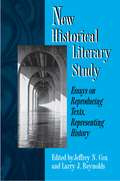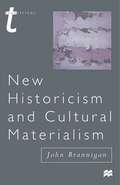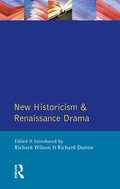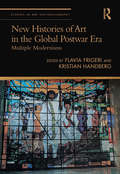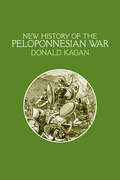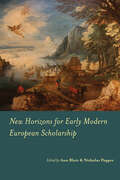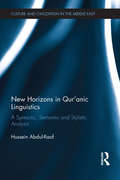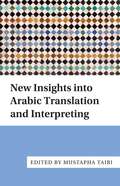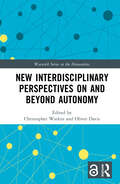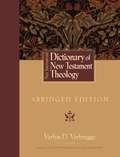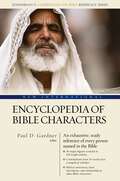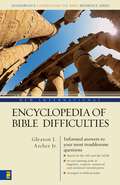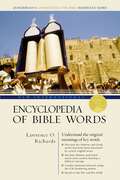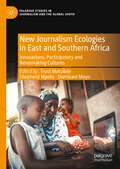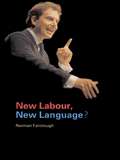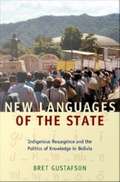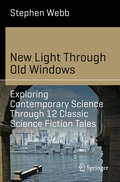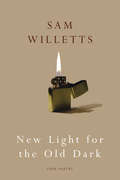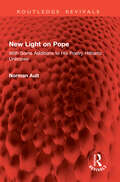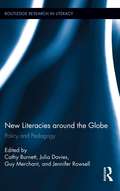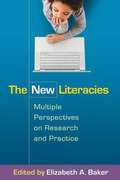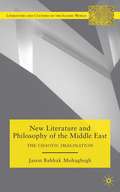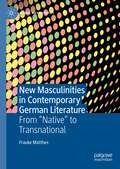- Table View
- List View
New Historical Literary Study: Essays on Reproducing Texts, Representing History
by Jeffrey N. Cox & Larry J. ReynoldsThis volume, growing out of the celebrated turn toward history in literary criticism, showcases some of the best new historical work being done today in textual theory, literary history, and cultural criticism. The collection brings together for the first time key representativesfrom various schools of historicist scholarship, including leading critics whose work has helped define new historicism. The essays illuminate literary periods ranging from Anglo-Saxon to postmodern, a variety of literary texts that includes The Siege of Thebes, Macbeth, The Jazz Singer, and The Chosen Place, the Timeless People, and central issues that have marked new historicism: power, ideology, textuality, othering, marginality, exile, and liberation. The contributors are Janet Aikins, Lawrence Buell, Ralph Cohen, Margaret Ezell, Stephen Greenblatt, Terence Hoagwood, Jerome McGann, Robert Newman, Katherine O'Keeffe, Lee Patterson, Michael Rogin, Edward Said, and Hortense Spillers. The editors' introduction situates the various essays within contemporary criticism and explores the multiple, contestatory issues at stake within the historicist enterprise.
New Historicism and Cultural Materialism
by John BranniganNew historicism and cultural materialism emerged in the early 1980s as prominent literary theories and came to represent a revival of interest in history and in historicising literature. Their proponents rejected both formalist criticism and earlier attempts to read literature in its historical context and defined new ways of thinking about literature in relation to history. This study explains the development of these theories and demonstrates both their uses and weaknesses as critical practices. The potential future direction for the theories is explored and the controversial debates about their validity in literary studies are discussed.
New Historicism and Renaissance Drama (Longman Critical Readers)
by Richard Wilson Richard DuttonNew Historicism has been one of the major developments in literary theory over the last decade, both in the USA and Europe. In this book, Wilson and Dutton examine the theories behind New Historicism and its celebrated impact in practice on Renaissance Drama, providing an important collection both for students of the genre and of literary theory.
New Histories of Art in the Global Postwar Era: Multiple Modernisms (ISSN)
by Flavia FrigeriThis book maps key moments in the history of postwar art from a global perspective. The reader is introduced to a new globally oriented approach to art, artists, museums and movements of the postwar era (1945–70). Specifically, this book bridges the gap between historical artistic centers, such as Paris and New York, and peripheral loci. Through case studies, previously unknown networks, circulations, divides and controversies are brought to light. From the development of Ethiopian modernism, to the showcase of Brazilian modernity, this book provides readers with a new set of coordinates and a reassessment of well-trodden art historical narratives around modernism. This book will be of interest to scholars in art historiography, art history, exhibition and curatorial studies, modern art and globalization.
New Histories of Art in the Global Postwar Era: Multiple Modernisms (Studies in Art Historiography)
by Flavia FrigeriThis book maps key moments in the history of postwar art from a global perspective. The reader is introduced to a new globally oriented approach to art, artists, museums and movements of the postwar era (1945–70). Specifically, this book bridges the gap between historical artistic centers, such as Paris and New York, and peripheral loci. Through case studies, previously unknown networks, circulations, divides and controversies are brought to light. From the development of Ethiopian modernism, to the showcase of Brazilian modernity, this book provides readers with a new set of coordinates and a reassessment of well-trodden art historical narratives around modernism. This book will be of interest to scholars in art historiography, art history, exhibition and curatorial studies, modern art and globalization.
New History of the Peloponnesian War
by Donald KaganA New History of the Peloponnesian War is an ebook-only omnibus edition that includes all four volumes of Donald Kagan's acclaimed account of the war between Athens and Sparta (431–404 B.C.): The Outbreak of the Peloponnesian War, The Archidamian War, The Peace of Nicias and the Sicilian Expedition, and The Fall of the Athenian Empire. Reviewing the four-volume set in The New Yorker, George Steiner wrote, "The temptation to acclaim Kagan's four volumes as the foremost work of history produced in North America in the twentieth century is vivid. . . . Here is an achievement that not only honors the criteria of dispassion and of unstinting scruple which mark the best of modern historicism but honors its readers." All four volumes are also sold separately as both print books and ebooks.
New Horizons for Early Modern European Scholarship
by Ann Blair and Nicholas PopperAn illuminating exploration of the new frontiers—and unsettled geographical, temporal, and thematic borders—of early modern European history.The study of early modern Europe has long been the source of some of the most creative and influential movements in historical scholarship. New Horizons for Early Modern European Scholarship explores recent developments in historiography both to exhibit the field's continuing vibrancy and to highlight emerging challenges to long-assumed truths. Essays examine • how key ideas and intellectual practices arose, circulated through scholarly culture, and gave way to subsequent forms • Europe's transforming relationship with Asia, the Americas, Africa, and the rest of the world• how overlooked evidence illuminates vital but obscured people, practices, and objects • connections between disciplines, types of sources, time periods, and placesOpening up emerging possibilities, this book demonstrates that early modern European scholarship remains a source for groundbreaking historical insights and methodologies that would benefit the study of any time and place. Contributors: Alexander Bevilacqua, Ann Blair, Daniela Bleichmar, William J. Bulman, Frederic Clark, Anthony Grafton, Jill Kraye, Yuen-Gen Liang, Elizabeth McCahill, Nicholas Popper, Amanda Wunder
New Horizons in Qur'anic Linguistics: A Syntactic, Semantic and Stylistic Analysis (Culture and Civilization in the Middle East)
by Hussein Abdul-RaofNew Horizons in Qur'anic Linguistics provides a panoramic insight into the Qur'anic landscape fenced by innate syntactic, semantic and stylistic landmarks where context and meaning have closed ranks to impact morphological form in order to achieve variegated illocutionary forces. It provides a comprehensive account of the recurrent syntactic, stylistic, morphological, lexical, cultural, and phonological voids that are an iceberg looming in the horizon of Qur'anic genre. It is an invaluable resource for contrastive linguistics, translation studies, and corpus linguistics. Among the linguistic topics are: syntactic structures, ellipsis, synonymy, polysemy, semantic redundancy, incongruity, and contrastiveness, selection restriction rule, componential features, collocation, cyclical modification, foregrounding, backgrounding, pragmatic functions and categories of shift, pragmatic distinction between verbal and nominal sentences, morpho-semantic features of lexical items, context-sensitive word and phrase order, vowel points and phonetic variation. The value of European theoretical linguistics to the analysis of the Qur’anic text at a macro level has been overlooked in the academic literature to date and this book addresses this research gap, providing a key resource for students and scholars of linguistics and specifically working in Arabic or Qur’anic Studies.
New Insights into Arabic Translation and Interpreting
by Mustapha TaibiThis book addresses translation and interpreting with Arabic either as a source or target language. It focuses on new fields of study and professional practice, such as community translation and interpreting, and offers fresh insights into the relationship between culture, translation and interpreting. Chapters discuss issues relating specifically to Arabic and the Arab cultural context and contribute views, research findings and applications that come from a language combination and a cultural background quite different from traditional Eurocentric theoretical and professional positions. This volume is a significant addition to resources on Arabic translation and interpreting and contributes fresh perspectives to translation studies in general. It is of interest to students, researchers and professionals working in public service, community, legal, administrative and healthcare translation and interpreting, as well as intercultural communication and translator education.
New Interdisciplinary Perspectives On and Beyond Autonomy (Warwick Series in the Humanities)
by Oliver Davis Christopher WatkinWhat does ‘autonomy’ mean today? Is the Enlightenment understanding of autonomy still relevant for contemporary challenges? How have the limits and possibilities of autonomy been transformed by recent developments in artificial intelligence and big data, political pressures, intersecting oppressions and the climate emergency? The challenges to autonomy today reach across society with unprecedented complexity, and in this book leading scholars from philosophy, economics, linguistics, literature and politics examine the role of autonomy in key areas of contemporary life, forcefully defending a range of different views about the nature and extent of resistance to autonomy today. These essays are essential reading for anyone who wants to understand the predicament and prospects of one of modernity’s foundational concepts and one of our most widely cherished values. Chapter 5.6 and 9 of this book is freely available as a downloadable Open Access PDF at http://www.taylorfrancis.com under a Creative Commons [Attribution-Non Commercial-No Derivatives (CC-BY-NC-ND)] 4.0 license.
New International Dictionary of New Testament Theology: Abridged Edition
by Verlyn VerbruggeThis abridgment of Colin Brown’s original four volume work is arranged with its entries in Greek alphabet order, which makes it easy to find the discussion of a particular word. All Greek words are transliterated into English and linked with their Goodrick/Kohlenberger numbers. This book was formerly titled The NIV Theological Dictionary of New Testament Words. Now it has been reset in double columns and wider margins.
New International Encyclopedia of Bible Characters: The Complete Who's Who in the Bible (Zondervan's Understand the Bible Reference Series)
by Paul D. GardnerAn exhaustive, ready reference of every person named in the Bible 40 major figures covered in full-length articles Contributions from 24 world-class evangelical scholars Biblical references, brief description and relationship to other Bible Characters Uncover the Value of Every Man and Woman in the Bible From Aaron to Zurishadai, the New International Encyclopedia of Bible Characters is an exhaustive, ready reference of every person named in the Bible. Discover the parts men and women from the obscure to the famous to the infamous have played in the unfolding story of Scripture. Entries range from one-line biblical references for minor characters to full-length articles that address the theological significance of over forty major figures. With entries based on the New International Version—today’s most read, most trusted Bible translation—this easy-to-use volume will help pastors, teachers, students, and church workers identify and understand the importance of every person in the Bible. The New International Encyclopedia of Bible Characters features contributions from top biblical scholars of the United States, the United Kingdom, and Australia. In addition to the alphabetic name-entries, twenty supporting articles shed light on topics of particular interest and relevance, such as: • Kings of Judah and Israel • Women in the Bible • Children in the Bible • The Apostles • Pharisees • The Elderly in the Bible • Angels in the Bible • Jewish Genealogies ZONDERVAN’S UNDERSTAND THE BIBLE REFERENCE SERIES This six-volume series supplies users of today’s most popular modern Bible translation, the New International Version, with scholarly, economical, and uncompromisingly evangelical study tools. It includes the New International Bible Commentary, New International Bible Dictionary, New International Bible Concordance, and New International Encyclopedia of Bible Words, New International Encyclopedia of Bible Difficulties, and the New International Encyclopedia of Bible Characters.
New International Encyclopedia of Bible Difficulties (Zondervan's Understand the Bible Reference Series)
by Gleason L. Archer Jr.Did God approve of Rahab’s lie? Why are many of the Old Testament quotes in the New Testament not literal? Does the Bible class abortion with murder? Where did Adam and Eve’s sons get their wives? Does 1 Corinthians 7:10–16 authorize divorce for desertion? What do you make of the difficult areas in the Bible—those puzzling passages that make you stop and scratch your head? The seeming contradictions and inconsistencies of Scripture actually have sound explanations. But unless you’re a Bible scholar, you probably don’t know about them. That’s why you need the New International Encyclopedia of Bible Difficulties. It gives you informed answers to your most troublesome questions. Some of the solutions seem obvious—after you’ve read them. But most include an eye-opening look at linguistic, cultural, numerical, relational, and other considerations of which most Bible readers are unaware. Referencing both the New International Version and the New American Standard Bible, this helpful resource makes scholarly insights accessible to everyone. Whether you’re a student, pastor, everyday Bible-lover, or even a skeptic, the New International Encyclopedia of Bible Difficulties will show you why the Bible is believable and dependable, with a message you can live by. Zondervan’s Understand the Bible Reference Series This six-volume series supplies users of today’s most popular modern Bible translation, the New International Version, with scholarly, economical, and uncompromisingly evangelical study tools. It includes the New International Bible Commentary, New International Bible Dictionary, New International Bible Concordance, and New International Encyclopedia of Bible Words, New International Encyclopedia of Bible Difficulties, and the New International Encyclopedia of Bible Characters.
New International Encyclopedia of Bible Words (Zondervan's Understand the Bible Reference Series)
by Lawrence O. RichardsThe Rich Meaning Behind the Hebrew and Greek Words of the Bible Whether you’re a pastor, a student, or simply a lover of the Bible, this book helps you get more out of God’s Word by revealing the original meanings of key biblical words. The reader-friendly, narrative style makes it easy to explore the Hebrew and Greek words that lie behind the English words. You’ll discover significant shades of meaning and nuances that bring depth to your understanding of Scripture. This highly accessible reference tool surpasses the well-known Vine’s Expository Dictionary of New Testament Words in a number of ways: • Thorough coverage of both Old and New Testaments gives you a firm grasp of the entire Bible. • The Goodrick/Kohlenberger numbering system allows for accurate identification of Hebrew and Greek words. • Top evangelical scholarship ensures current insights into the meanings of words. • Biblical concepts are fully discussed, providing you not only with understanding, but also, where appropriate, with practical and devotional insights you can apply to your life. • Entry words are taken from the NIV and the NASB—respectively, the best-selling contemporary translation and today’s most literal word-for-word translation. • Major KJV terms are cross-referenced to broaden your understanding of translational nuances and distinctions. • Four indexes include: Hebrew words, Greek words, Scripture references, and topical index. “Exceptional value . . . Clear, precise, and balanced.”—James Montgomery Boice, Pastor, Tenth Presbyterian Church, Philadelphia “A milestone in Bible study aids.”—Jerry E. White, Executive Director, The Navigators Zondervan’s Understand the Bible Reference Series This six-volume series supplies users of today’s most popular modern Bible translation, the New International Version, with scholarly, economical, and uncompromisingly evangelical study tools. It includes the New International Bible Commentary, New International Bible Dictionary, New International Bible Concordance, and New International Encyclopedia of Bible Words, New International Encyclopedia of Bible Difficulties, and the New International Encyclopedia of Bible Characters.
New Jersey Performance Coach, English Language Arts, [Grade 6]
by Triumph LearningNIMAC-sourced textbook
New Journalism Ecologies in East and Southern Africa: Innovations, Participatory and Newsmaking Cultures (Palgrave Studies in Journalism and the Global South)
by Dumisani Moyo Shepherd Mpofu Trust MatsileleThis volume presents case studies of news media employing and integrating social media into their news production practices. It links social media use to journalistic practices and news production processes in the digital age of the Global South. Critically, the chapters look at seminal cases of start-up news media whose content is informed by trends in social media, ethical considerations and participatory cultures spurred by the wide use of social media. There has been considerable research looking at the potential of new media technologies, traditional journalism and citizen reporting. The extent to which these new media technologies and ‘citizen journalism’ have morphed or reconfigured traditional journalism practice remains debatable. Currently, there are questions around the limits of social media in journalism practice as the ethical lines continue to become blurred. It is this conundrum of the role of social media in the reconfiguration of the media, news making, production and participatory cultures that requires more investigation. Social media has also turned the logic of the political economy of media production on its head as citizens can now produce, package and distribute news and information with shoestring budgets and in authoritarian regimes with no license of practice. This new political economy means the power that special interest groups used to enjoy is increasingly slipping from their hands as citizens take back the power to appropriate social media journalism to counter hegemonic narratives. Citizens can also perform journalistic roles of investigating and whistleblowing but with a lack off, or limited, regulation. This volume seeks to explore and untangle these issues, and provides an invaluable resource for researchers across the field of journalism, mass media, and communication studies.
New Labour, New Language?
by Norman FaircloughThis is a book about the politics of New Labour that focuses on language. Fairclough gets behind the rhetoric to uncover the real meaning. He examines a wide range of political speeches and texts, from Tony Blair's speech following the death of Diana to the 1997 Labour Party Manifesto and Bill Clinton's book Between Hope and History. New Labour, New Language? blows open the whole debate on the nature of the political discourse of New Labour and the 'Third Way'.Written in a clear, non-technical style and including a glossary, New Labour, New Language? will appeal to anyone interested in language and politics.
New Languages of the State: Indigenous Resurgence and the Politics of Knowledge in Bolivia
by Bret GustafsonDuring the mid-1990s, a bilingual intercultural education initiative was launched to promote the introduction of indigenous languages alongside Spanish in public elementary schools in Bolivia's indigenous regions. Bret Gustafson spent fourteen years studying and working in southeastern Bolivia with the Guarani, who were at the vanguard of the movement for bilingual education. Drawing on his collaborative work with indigenous organizations and bilingual-education activists as well as more traditional ethnographic research, Gustafson traces two decades of indigenous resurgence and education politics in Bolivia, from the 1980s through the election of Evo Morales in 2005. Bilingual education was a component of education reform linked to foreign-aid development mandates, and foreign aid workers figure in New Languages of the State, as do teachers and their unions, transnational intellectual networks, and assertive indigenous political and intellectual movements across the Andes. Gustafson shows that bilingual education is an issue that extends far beyond the classroom. Public schools are at the center of a broader battle over territory, power, and knowledge as indigenous movements across Latin America actively defend their languages and knowledge systems. In attempting to decolonize nation-states, the indigenous movements are challenging deep-rooted colonial racism and neoliberal reforms intended to mold public education to serve the market. Meanwhile, market reformers nominally embrace cultural pluralism while implementing political and economic policies that exacerbate inequality. Juxtaposing Guarani life, language, and activism with intimate portraits of reform politics among academics, bureaucrats, and others in and beyond La Paz, Gustafson illuminates the issues, strategic dilemmas, and imperfect alliances behind bilingual intercultural education.
New Light Through Old Windows: Exploring Contemporary Science Through 12 Classic Science Fiction Tales (Science and Fiction)
by Stephen Webb<p>This book presents the reader with some of the earliest classic SF short stories – all of them published between 1858 and 1934, featuring both well-known and long-forgotten writers – dealing for the first time with topics to which science had (some) answers only at much later stages. This includes aspects of alien life forms, transmogrification, pandemics, life on Mars, android robots, big data, matter transmission and impact events to name but a few. <p>The short stories are reprinted in full alongside extensive commentaries which also examine some of the latest scientific thinking surrounding the story’s main theme and provide the reader with suggestions for further reading.</p>
New Light for the Old Dark
by Sam WillettsThe poems in this remarkable first collection have been hard won: 'Fruits of much grief they are,' as Donne said, 'emblems of more.' Having lost ten years to heroin addiction and recovery, Sam Willetts emerges now - suddenly, and apparently from nowhere - as a fully-fledged and significant English poet.In a book deeply conscious of history, one series of poems tracks his mother's escape, as a young girl, from the Nazis, in a narrative that moves from a Stuka attack on the Smolensk Road to the Krakow ghetto, the destruction of Warsaw, to Nuremberg and Nagasaki and, finally, his mother's grave. Other poems address Englishness, secular Jewishness, and the childhood pleasures of Oxfordshire - an increasingly deceptive pastoral, stalked and eventually shattered by heroin, which brings a grim new existence among dealers and users. The redemption the poet finds, through detox and rehab, love and writing, is full of regret for the years and lives wasted, but also offers a lyrical rebirth of the senses: 'In a new light, a new moon/ that isn't made of scorched tinfoil/will turn your tide again'.Deft, economical and wonderfully original, this is work that celebrates the peaks and troughs of a lived life, the poems' vivid clarity feeling both fresh and fully earned. It is rare to find an unknown poet of such mature quality, and New Light for the Old Dark represents a brilliant dawning.
New Light on Pope: With Some Additions to His Poetry Hitherto Unknown (Routledge Revivals)
by Norman AultFirst published in 1949, New Light on Pope is a collection of new poems by one of the greatest poets; new facts about his life and work; new judgements on his quarrels; new evidence of his loyalty to his friends; and new solutions of old problems.These discoveries made during twenty years of intermittent research are presented in this volume which has already been declared by a well-known biographer of the poet definitely to establish Pope once for all as the man he was.Other names, beside Pope’s, figure in the present work; and people like Addison, Swift, Gay, and Cibber, to mention only the best known, are seen in actions and attitudes which will be unfamiliar even to eighteenth century specialists.
New Literacies around the Globe: Policy and Pedagogy (Routledge Research in Literacy)
by Jennifer Rowsell Cathy Burnett Guy Merchant Julia DaviesThe increasing popularity of digitally-mediated communication is prompting us to radically rethink literacy and its role in education; at the same time, national policies have promulgated a view of literacy focused on the skills and classroom routines associated with print, bolstered by regimes of accountability and assessments. As a result, teachers are caught between two competing discourses: one upholding a traditional conception of literacy re-iterated by politicians and policy-makers, and the other encouraging a more radical take on 21st century literacies driven by leading edge thinkers and researchers. There is a pressing need for a book which engages researchers in international dialogue around new literacies, their implications for policy and practice, and how they might articulate across national boundaries. Drawing on cutting edge research from the USA, Canada, UK, Australia and South Africa, this book is a pedagogical and policy-driven call for change. It explores studies of literacy practices in varied contexts through a refreshingly dialogic style, interspersed with commentaries which comment on the significance of the work described for education. The book concludes on the ‘conversation’ developed to identify key recommendations for policy-makers through a Charter for Literacy Education. .
New Literacies: Multiple Perspectives on Research and Practice
by Elizabeth BakerWith contributions from leading scholars, this compelling volume offers fresh insights into literacy teaching and learning and the changing nature of literacy itself in today's K 12 classrooms. The focus is on varied technologies and literacies such as social networking sites, text messaging, and online communities. Cutting-edge approaches to integrating technology into traditional, print-centered reading and writing instruction are described. Also discussed are ways to teach the new skills and strategies that students need to engage effectively with digital texts. The book is unique in examining new literacies through multiple theoretical lenses, including behavioral, semiotic, cognitive, sociocultural, critical, and feminist perspectives.
New Literature and Philosophy of the Middle East: The Chaotic Imagination
by Jason Bahbak MohagheghMohaghegh tracks the idea of 'chaos' into the contemporary philosophical and cultural imagination of the postcolonial world, exploring its vital role in the formation of an emergent avant-garde literature in the Middle East, concentrating on the writings of the twentieth-century Iranian new wave.
New Masculinities in Contemporary German Literature: From ‘‘Native’’ to Transnational (Global Masculinities)
by Frauke MatthesThe complex nexus between masculinity and national identity has long troubled, but also fascinated the German cultural imagination. This has become apparent again since the fall of the Iron Curtain and the turn of the millennium when transnational developments have noticeably shaped Germany’s self-perception as a nation. This book examines the social and political impact of transnationalism with reference to current discourses of masculinity in novels by five contemporary male German-language authors. Specifically, it analyses how conceptions of the masculine interact with those of nationality, ethnicity, and otherness in the selected texts and assesses the new masculinities that result from those interactions. Exploring how local discourses of masculinity become part of transnational contexts in contemporary writing, the book moves a consideration of masculinities from a "native" into a transnational sphere.
